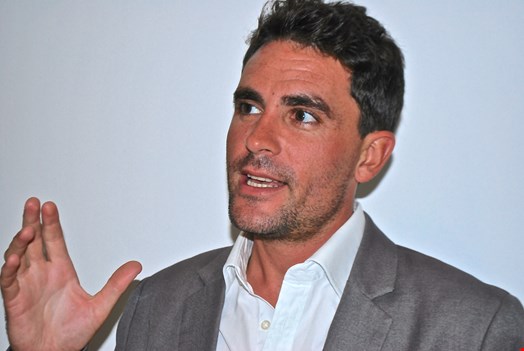
A man known for climbing mountains, trekking the entire length of the River Nile, authoring books, working as an army reservist and being a former member of the Parachute Regiment, Levison Wood’s opening keynote at this week’s Infosecurity Europe was expectedly popular.
Sitting with him at Olympia, his life experience made me feel rather inadequate, but I was keen to get an impression from someone used to facing risks, about what he considered to be a more effective way of dealing with risks in the cyber world. He introduced himself as an army reservist, speaker and “someone who does a lot of journeys”, but he said that a common recurring theme is that of risk, and doing something as safely as you can do in an environment.
I asked him about preparation, and with a security department facing attacks and so-called ‘threats’, I asked him about when he is planning a venture, how much does he know about the journey ahead?
“Typically when you go on an expedition I would do two years of preparation so there is a lot of time invested in getting funding, but alongside that it is not just getting visas or dealing with a governor of a province, you look at documents of a changing environment as in the field, you could be dealing with a massive earthquake in Nepal that may change the entire face of an expedition as that happened a couple of months before I set off, and as a result you have to change all of your plans,” he said.
“It is not as simple as making a plan and getting on with it; it is about putting measures in place and you have to be fluid and flexible and deal with changing circumstances.”
In terms of the enemy, it could be natural or an act of God, but in an instance where that happens, how do you immediately react? Levison said that it is all well and good assessing risk, but it is about having contingencies in place and incident response is crucial.
“Detection and prevention is not enough, in the army we call them Standard Operating Procedures and they are in place to deal with a challenge no matter how diverse it is, and you plan ahead and come up with a risk assessment but until you put those plans in place and practise your reverse plan, how do you plan for a lion attack or an earthquake or a tsunami if you are not used to dealing with those things,” he said.
“The reality is you do your best, but it is about being there as only then can you deal with it. Last year I broke my arm and only then could I deal with that as it was a crisis and I figured I needed to get on with the journey as soon as possible and deal with the problems so that you stick to the narrative as if I had malingered too long I would not have got back on with the journey.”
Levison also mentioned the impact of journalist Matthew Power who died on an expedition on the Nile, which he said was not preventable, and it was an invariable that you could not predict.
“So when something like that happens, you have to deal with the crisis as it unfolds, or let it impact you and not carry on, or you learn lessons,” he said.
So if you have been hit once, does that make you more resilient for the next time it happens? Levison said that if someone broke a bone falling off a bike, they may get back on or not do it again, so it is about choice and if you decide to do it again and know what it feels like you have to learn your lessons and try to not let it happen again.
“People are risk averse but the more you are exposed to risk, the more you can analyse and assess it and decide if it is a risk at all,” he said. “We all face risks on a day to day basis, look at a car – anything can go wrong: the brakes may fail, someone could drive into you or whatever, but we have to do it. In parachuting you may think it is a stupid thing to do, but actually the chances of anything going wrong are actually really small so it is not as big a risk as you may think so you have to look at things rationally and not emotionally.”
So in an instance where a crisis appears, what was his advice on making a swift decision? Levison said it comes with experience, but the more you make split second decisions in a rational manner when faced with a potential threat, the better you react.
“As I was in the army and was trained to use guns and weapons, I know what is safe or dangerous and when in Iraq or Afghanistan and you are faced with lots of weapons, you know what is safe.
In our next article, we talk to Levison Wood about his army experience and how the military can aid the security industry.
